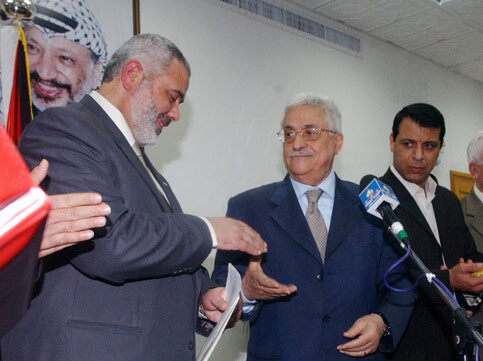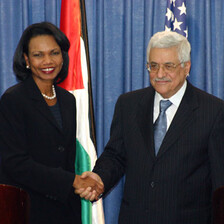The Electronic Intifada 18 June 2007

In Gaza City Palestinian President Mahmoud Abbas giving the letter of appointment to Prime Minister Ismail Haniyeh, 15 February 2007. (MaanImages/POOL/PPO)
Having sacked Ismail Haniyeh of Hamas and dissolved his democratically-elected government, Palestinian Authority (PA) president Mahmoud Abbas has now installed Salam Fayyad as the new Prime Minister, to the clear delight of the West. Mutual accusations are hurled by Abbas and Haniyeh that the other side launched a coup against the legitimate authority. Nevertheless, now a fresh line of grave Palestinian faces has lined up before the cameras as Fayyad’s new “emergency government” is sworn in. That the new PA has virtually no power in the West Bank, and none at all in Gaza, is the first glaring problem with this pageantry. (Bitter jokes about a ‘two-state solution’ consisting of the West Bank and Gaza Strip have circulated.)
An international community worried by the ‘coup’ accusation might endorse the Fayyad government as the seemingly correct position. But the ‘coup’ claim stumbles over a basic problem — that Abbas’s appointing a new prime minister was itself entirely illegal. The new ‘emergency government’ is illegal, too. According to the Basic Law of Palestine (as amended in 2003), which serves as the constitution of the PA, Abbas can do neither of these things. Nor can the new ‘emergency government’ claim any democratic mandate. This means that Abbas and the Fayyad government are ruling by decree, outside the framework of the Basic Law. So on what basis is that government supposed to govern — and on what basis are foreign governments supposed to deal with it?
According to the Basic Law, Abbas has violated a whole stream of Articles as well as the spirit of its checks and balances, which were designed during the Arafat era partly to limit the power of the presidency. With full US and Israel support (if not their insistence), Abbas has baldly trashed numerous provisions of the Basic Law, including:
What does this mean for the PA? It is no longer the same animal. The Fayyad government is the step-child of an extra-legal process with no democratic mandate. The whole manoeuvre is not precisely a palace coup, but it is something like it.
What does this mean for the world? Foreign governments now confront one of the most unwelcome events in international diplomacy — the sudden transformation of a government into a different kind of government. As in any revolution or coup, diplomatic recognition of Salam Fayyad’s “emergency Government” as the legitimate representative of the Palestinian people must now be reassessed. For example, by what authority does the “emergency government” act in the name of Palestinians in the West Bank and Gaza? What capacities and responsibilities does the “emergency government” now have? On what legal and political bases are diplomatic relations to be sustained?
We must admit that these are legal but also political questions. The PA is the invention of the 1993 and 1995 Oslo Accords (it was supposed to serve for a period “not exceeding five years”). But the Basic Law was developed later, to confirm and ensure its democratic character. This set of laws represented a Palestinian state-building measure, providing a start-up framework for Palestinian democracy in anticipation (or at least affirmation) of eventual Palestinian statehood. Hence the Basic Law refers in its introduction to the 1995 Oslo 2 accord but also invokes the Palestinian people as its ultimate political authority (Article 2: “… the people are the source of power …”). Governments may therefore attempt to justify sustaining relations with the new Fayyad government out of solidarity with the Palestinian national effort — albeit one in crisis.
Still, in attempting this, foreign governments now face dubious and perplexing options:
They could suspend diplomatic relations with the Fayyad government, on grounds that it is illegal, and deal with the elected Haniyeh government. But this might cripple their communication with Ramallah at a critical time and put them at odds with the US and Israel.
They could sustain diplomatic relations with the Fayyad government, accepting its claim that the Hamas government launched a coup, but they would then be endorsing a government that is violating its own laws and has itself effectively pulled a coup.
They could accept the new Fayyad government on condition that it now obey other provisions of the Basic Law, such as gaining Legislative Council approval and/or calling new elections. But the Basic Law doesn’t allow the Cabinet to call new elections and this new Cabinet doesn’t have any legal standing to govern anyway. (It’s also hard to see how new national elections could be held when the Haniyeh government refuses to recognize the new Cabinet and conditions in both territories are so contrary to free and fair elections.)
They could pull a classic diplomatic side-step by calling the situation a temporary constitutional crisis and maintaining relations with both sides, but this tactic will quickly bog down because present events look more like the complete collapse of the Basic Law and its framework.
Facing this mess, they could do a back-step: suspend formal diplomatic relations but maintain communication with both sides, pending further developments, but what about those formal agreements (exchange, trade, security, diplomatic representation) they may have signed with the PA? Which side is truly representative and to whom are they accountable?
There are other legalistic maneuvers they could try, such as treating the PA under terms established by the Oslo Accords or the Gaza-Jericho agreement of 1994. But none of those documents provide for a prime minister or any of the procedures being acted out in Ramallah.
In short, the diplomatic landscape is now in utter disarray. The Fayyad Government has no democratic mandate, is not operating by the very rules that establish its democratic legitimacy, and so is only a facsimile of the ‘government’ with which many of the world’s states established diplomatic relations. It does not help that the United States, an obedient Europe, and legless Arab states have trotted up to anoint it as the sole legitimate authority. Nor does it help to pretend that Hamas — a broad movement with popular legitimacy — will simply disappear through decrees from Abbas and some nice political theatre.
It is not clear how long this flimsy diplomatic pretense can hold up to scrutiny by a skeptical world. Nor is it clear what political costs foreign governments will have to absorb if they try to play along with it — especially when the now-traumatized Palestinian people, in the territories and in Diaspora, begin protesting their government’s being hijacked by anti-democratic figureheads for Israeli and US agendas. Being targeted as supporting this pantomime government was not the goal of those governments who recognized the PA to support the Palestinian people. As UN official Alvaro De Soto put it in his eloquent ‘End of Mission Report’ this May, ‘It may be better to be the one who raises questions about the Emperor’s new clothes than to be ridiculed as the naked Emperor oneself.’
Virginia Tilley is a US citizen now working in Pretoria, South Africa. She can be reached at vtilley AT mweb DOT co DOT za.
Related Links





